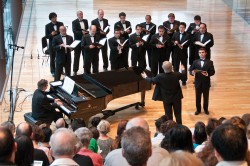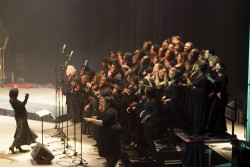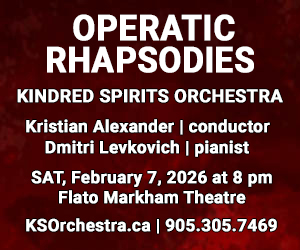Last month I devoted a column to a discussion of Bach’s choral music, works that have probably become as central to the European choral canon as anything one can think of. This month, for contrast, I’ll write about lesser known and/or modern works being performed in March and April, and of choral endeavours that have sprung from other traditions as well. What follows is only a few of many excellent concerts this month – please consult the listings for more choices.
 The baroque French composer François Couperin (1668-1733) has traditionally been known for his innovative harpsichord compositions, and his influence on the keyboard works of later composers. In recent years musicians have been investigating his vocal works. While there are good recordings of Couperin’s choral music available, concerts of it are rare in this area. We have a chance to hear one of his early works, the Messe a l’usage ordinaire des paroisses (mass for regular parish use) performed by the Victoria Scholars on March 6. Belying its somewhat lumpish utilitarian title, it has the dancing rhythms typical of French choral music of this era.
The baroque French composer François Couperin (1668-1733) has traditionally been known for his innovative harpsichord compositions, and his influence on the keyboard works of later composers. In recent years musicians have been investigating his vocal works. While there are good recordings of Couperin’s choral music available, concerts of it are rare in this area. We have a chance to hear one of his early works, the Messe a l’usage ordinaire des paroisses (mass for regular parish use) performed by the Victoria Scholars on March 6. Belying its somewhat lumpish utilitarian title, it has the dancing rhythms typical of French choral music of this era.
Another composer better known for his keyboard works than choral music is 19th century German Josef Rheinberger. In recent years, the Lyrica Chamber Choir of Barrie has made a project of reviving Rheinberger’s work. On March 26, they perform his Missa Brevis Op.117.
I’ve known choral conductor Ron Cheung since we were young tenors in the Toronto Mendelssohn Youth Choir, in the years when it was conducted by choral wild man Robert Cooper. Ron founded the Voices Choir in 1996. In celebration of Ron’s 20th year of choral conducting and Voices’ 15th year in existence, they are presenting a programme on April 2 that includes Robert Schumann’s very rare late period setting of the Requiem text. It is not a work I know at all, but the inevitable “net search” reveals that it clearly has its champions. Schumann fans and others curious about his quirky, dynamic music might well want to give it a listen, especially performed live.
While the classical music world’s focus on the music of past centuries is often seen as conservative and unadventuresome, deeper investigation into neglected areas of musical history has resulted in the rediscovery and rehabilitation of female composers of past centuries. In honour of the centenary of International Women’s Day on March 8, St. Catharine’s “Primavera Concerts” are presenting an all day series of three separate concerts on March 5. Along with music by composers from earlier times – Hildegard von Bingen and the amazing Barbara Strozzi – the excellent Oriana Women’s Choir will perform works by Canadian choral heroes Ruth Watson Henderson and Eleanor Daley. These two composers constitute a genuine Canadian tradition of their own, and their works have anchored many a concert in this part of the world (including the Voices concert mentioned above).
 I had the pleasure to participate in a choral event in December at which the Toronto Mass Choir performed. Many choirs make pleasant sounding music in a pleasant manner. The Toronto Mass Choir is the kind of group that arrests your attention with their exuberance and rhythmic drive. Choirs steeped in European traditions often stumble when executing gospel music. Two common elements of gospel performance are memorization and physical movement, the precise opposite of what most choirs are accustomed to. Freeing one’s hands of the necessity to hold a music folder allows singers to sway and clap on the off–beat. These elements are really not just options with gospel – they’re often as necessary to its performance tradition as agile coloratura is to Handel and Mozart.
I had the pleasure to participate in a choral event in December at which the Toronto Mass Choir performed. Many choirs make pleasant sounding music in a pleasant manner. The Toronto Mass Choir is the kind of group that arrests your attention with their exuberance and rhythmic drive. Choirs steeped in European traditions often stumble when executing gospel music. Two common elements of gospel performance are memorization and physical movement, the precise opposite of what most choirs are accustomed to. Freeing one’s hands of the necessity to hold a music folder allows singers to sway and clap on the off–beat. These elements are really not just options with gospel – they’re often as necessary to its performance tradition as agile coloratura is to Handel and Mozart.
Choirs can often be bribed to memorize music with extra goodies at break time, but movement while singing remains difficult for many groups – a basic shift in weight from one foot to the other can be enough to cause the pitch to drop and the tempo to drag. This kind of movement has to be built into the practice of the music from the beginning. While it is difficult, the advantage for choral singers is plain to see – a choir that programs a choral concert will likely be in better shape that season than ever before. Choirs interested in innovative marketing strategies might well consider the appeal of “choral–cize” concerts to a fitness–minded audience eager to work up a sweat. But I digress.
For choral musicians interested in getting their gospel chops in shape, Toronto Mass Choir and its dynamic director, Karen Burke, are hosting Power Up 2011, an annual gospel music workshop on the weekend of March 4-6. The weekend includes workshops in vocal improvisation and songwriting, and culminates in a mass choir performance on the Sunday evening of the weekend. More information can be found at the Choir’s website www.tmc.ca.
Lastly, on April 2, the Toronto Chamber Choir devotes an evening to the works of Josquin Des Prez (c. 1450 approx - 1521). Josquin was quite possibly the world’s first genuine choral superstar. In a time in which music was not disseminated easily, his pan–national popularity and influence is well documented in sources from the early Renaissance. Now even more remote to our ears than Monteverdi, Byrd or Palestrina, his music denotes mystery, lost customs and sounds and beliefs. But well performed, it is hardly austere – he wrote rowdy and rhythmic popular songs as well as settings of religious texts.
Full disclosure prompts me to acknowledge that I have a small part to play in this concert. Likely, the proper thing for me to do was to not have written about it in the first place. But live performances of Josquin’s music are rare enough in this part of the world that I really have no choice but to risk my journalist’s credibility by highlighting it for The WholeNote readers. In the battle between journalistic ethics and Josquin, Josquin’s got to win pretty much every time. ν
Benjamin Stein is a Toronto tenor and theorbist. He can be contacted at choralscene@thewholenote.com



